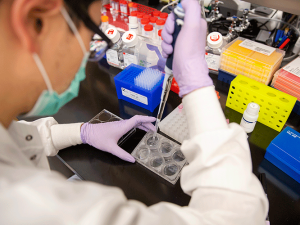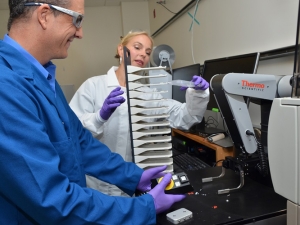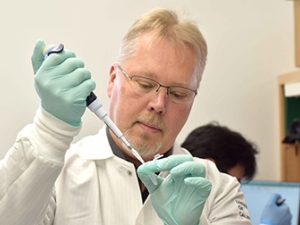

Research Bio
Anders Näär is a molecular and biologist whose research investigates gene regulation, metabolism, and RNA biology. He is best known for studies of microRNAs and noncoding RNAs in regulating metabolic pathways, particularly cholesterol and lipid metabolism. Näär’s work integrates molecular biology, genomics, and systems biology to uncover how RNA molecules contribute to health and disease. His research has implications for understanding metabolic disorders such as obesity, diabetes, and cardiovascular disease. He is currently Professor of metabolic Biology in the Department of Nutritional Sciences and Toxicology at UC Berkeley and has previously served on the faculty at Harvard Medical School.
The Näär laboratory has a long-standing interest in the transcriptional and microRNA regulatory networks governing cholesterol/lipid homeostasis and metabolic function. Their foundational work on sterol-regulatory element-binding proteins (SREBPs) uncovered atomic-level mechanisms of lipid metabolic control and challenged traditional assumptions about the druggability of transcription factor protein–protein interactions. These insights enabled structure-guided development of nanomolar small-molecule inhibitors of SREBP co-activator complexes with therapeutic promise for metabolic syndrome, type 2 diabetes, fatty liver disease, cardiovascular disease, and multiple cancers driven by dysregulated lipid metabolism.
Concurrently, the Näär lab has led discoveries identifying microRNAs as powerful regulators of systemic metabolism. Their breakthrough uncovering of miR-33a/b as intronic microRNA (miRNA) co-regulators of SREBPs has driven the development of antisense oligonucleotides (ASOs) that safely and potently improve cholesterol clearance and protect against atherosclerosis in vivo. Building on GWAS signals in >188,000 individuals, they subsequently identified miR-128 as a thrifty-like microRNA linking obesity, type 2 diabetes, and positive evolutionary selection to energy storage pathways. ASO silencing of miR-128 enhances metabolic rate and improves disease phenotypes across obesity, cardiometabolic disease, and non-alcoholic steatohepatitis (MASLD/MASH) models.
These programs have now expanded into a comprehensive precision RNA medicine strategy leveraging state-of-the-art AI/ML-informed antisense oligonucleotide design, including:
Therapeutic miRNA inhibition for:
Dyslipidemias (miR-33)
Dry age-related macular degeneration (miR-33)
Myocardial infarction-linked heart failure (miR-128)
Smoking-related cardiac dysfunction (miR-128)
Duchenne muscular dystrophy and aging-related sarcopenia (miR-128)
Neuroinflammatory and neurodegenerative disorders (e.g., stroke, PD) (miR-128)
Inhaled antiviral ASOs targeting essential viral genome structures in SARS-CoV-2 and influenza A, enabling a strain-agnostic pandemic-preparedness platform
Therapeutic targeting of “undruggable” oncogenes using ASOs to silence transcriptional drivers in:
Ultra-rare chordoma
Prevalent aggressive cancers including triple-negative breast cancer
AI-assisted precision design of ASOs to maximize potency, minimize toxicity and off-target effects, and accelerate clinical translation
Together, these innovations underpin a broader Precision RNA Medicine initiative emerging from UC Berkeley, unifying deep mechanistic biology, computational modeling, and therapeutic engineering. Through academic–industry collaborations and targeted startup formation, the Näär lab is advancing multiple first-in-class RNA therapeutic programs toward the clinic to meet unmet needs across metabolic, neuromuscular, infectious, and oncologic diseases.
Research Expertise and Interest
gene expression, microRNAs, mammalian cell metabolism, Metabolic Diseases, obesity, Type 2 diabetes, NAFLD/NASH, cancer therapies
In the News
Bakar Fellows Program Selects Seven Projects for Spark Awards
New Inhaled COVID-19 Therapeutic Blocks Viral Replication in the Lungs
Researchers discover link between microRNA and metabolic disorders
Scientists pivot to COVID-19 research, hoping for quick results to deal with pandemic
Insulin Insights
Featured in the Media
Scientists at the University of California, Berkeley, have created a new COVID-19 therapeutic that could one day make treating SARS-CoV-2 infections as easy as using a nasal spray for allergies. Anders Näär, a professor of metabolic biology in the Department of Nutritional Sciences and Toxicology (NST) at UC Berkeley , talks with CBS about the game-changing discovery. For more on this story, see our press release at Berkeley News.





